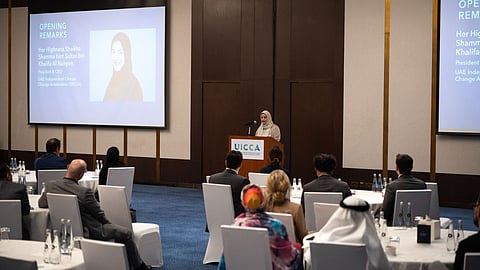UICCA Concludes First Carbon Border Adjustment Mechanism Advisory Session
Led by Her Highness Sheikha Shamma bint Sultan bin Khalifa Al Nahyan, President and CEO of UAE Independent Climate Change Accelerators (UICCA), the first of a two-part event session focusing on the Carbon Border Adjustment Mechanism (CBAM) was successfully concluded as part of the ongoing UICCA Policy Hacks series.
Co-hosted with the UAE Ministry of Economy (MoE) and supported by the British Embassy in the UAE, the session aims to raise awareness, consolidate insights, and shape policy recommendations to help UAE industries navigate the complexities of CBAM while fostering sustainable economic growth.
Entitled CBAM Policy Hack: UAE’s Path Forward, the event took place at the Jumeirah Saadiyat Island Resort in Abu Dhabi, bringing together more than 70 policymakers, industry experts, and thought leaders from the public and private sectors.
Key objectives of the event included raising awareness by engaging UAE stakeholders on upcoming CBAM policies, consolidating insights by discussing gaps, challenges, and best practices within UAE industries, and shaping policy recommendations through the formulation of insights to be shared with the MoE, and the Ministry of Climate Change and Environment (MoCCaE).
Her Highness Sheikha Shamma bint Sultan bin Khalifa Al Nahyan, President and CEO of UICCA, said: "Given the expected impact of CBAM, it is crucial that we deepen our understanding of global carbon pricing regulations and their implications, especially for industries that are hard to abate.
"We must prepare and adapt to these new regulations to ensure that the UAE remains competitive on the global stage while also upholding our commitments to environmental sustainability. I am confident that through our collective efforts, we will develop strategies that support our national industries and align with global standards.”
Edward Hobart CMG, British Ambassador to the UAE, said: “It is inspiring to see stakeholders from a range of fields collaborate and engage in dialogue to understand the impact of CBAMs and identify policies and strategies to reduce emissions.
"The problem of climate change requires all of us – private and public sector to work together. The UK is delighted to partner with the UAE on our respective journeys towards net zero and we are proud to be supporting UICCA in this important and timely event.”
His Excellency Juma Al Kait, Assistant Undersecretary for International Trade Affairs at MoE, said: “The Ministry of Economy is dedicated to ensuring that UAE industries are prepared for the challenges and opportunities presented by the Carbon Border Adjustment Mechanism (CBAM).
"Through convenings like UICCA’s Policy Hacks, we are engaging with key stakeholders across sectors to ensure our policies support our industries' competitiveness while advancing our commitment to sustainability and the UAE's Net Zero by 2050 goal."
Following the event opening remarks, Fatima Al Hajri, Director of the Investment and Talent Attraction Department at MoE, provided ministerial insights on the topic, and Khalid Tebe, Climate Policy Specialist at MoCCaE, discussed the UAE carbon market and carbon pricing initiatives.
The discussions then focused on UAE strategies for managing the challenges and exploring the opportunities presented by CBAM. Participants engaged in dynamic working group sessions to assess CBAM preparedness, identify gaps, share best practices, and develop potential strategies along with an implementation plan.
The sessions were further enriched by presentations from Assia Lomme, Senior Policy Advisor at His Majesty's Treasury; Ivano Ianelli, Senior Climate Change Advisor at Emirates Global Aluminum (EGA); Michael Klinkenberg, Policy Officer at the European Commission; and Dan Maleski, Senior Environmental Markets Advisor and CBAM Lead at Redshaw Advisors Ltd.
The second event of the two-part series on CBAM is tentatively scheduled for November 2024, where further discussions and refinements of the recommendations will take place.
UICCA Policy Hacks provides a platform for cross-sector stakeholders to come together and collaboratively tackle specific issues, with the goal of developing actionable solutions and policy recommendations that support the growth of the green economy.


